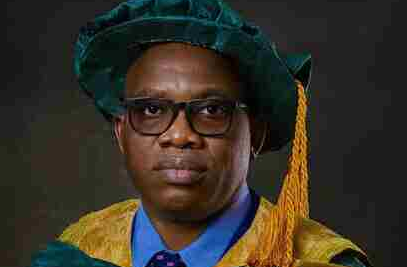Abuja, NIGERIA — In a bold move that has set the stage for a fierce showdown, Professor Bernard Odoh, the recently sacked Vice-Chancellor of Nnamdi Azikiwe University (NAU), Awka, has openly challenged the decision by President Bola Tinubu’s administration to remove him from office, asserting that the dismissal was unconstitutional and lacked due process.
Odoh, who was unceremoniously ousted along with the university’s governing council amidst allegations of “illegal” appointments, expressed his displeasure on Thursday, contending that his removal was unjust and unsubstantiated. Speaking in a heated interview with Arise TV, Odoh maintained that he would not accept his removal through a mere press release, a move he labeled as an affront to his academic career and leadership.
“I will not accept my removal through a press release,” Odoh declared. “The governing council appointed me, and it is only they who can recommend my dismissal after a thorough investigation.”
Odoh’s refusal to comply with the government’s decision underscores the deepening tension between him and the federal authorities, as he insists that there was no proper investigation or panel of inquiry into his tenure, contrary to what the government has claimed.
The Federal Government’s intervention came after rising concerns regarding Odoh’s appointment and his subsequent tenure. A statement issued by Bayo Onanuga, the Special Adviser on Information and Strategy to President Tinubu, claimed that the NAU governing council had violated the university’s laws by appointing Odoh in a manner that allegedly bypassed established protocols.
“The sacking of the governing council and its officials followed reports that the council had illegally appointed an unqualified vice-chancellor, disregarding the university’s governing laws in the process,” Onanuga’s statement read.
Following the announcement, tensions flared between the university’s Senate and the council, with the federal government stepping in to mediate and restore order. The statement further revealed the government’s concerns over the council’s apparent negligence in adhering to the proper procedures for the selection of leadership at the university.
Despite the government’s decision, Odoh remains defiant, accusing the administration of acting prematurely. He emphasized that his appointment as vice-chancellor was not made through a press release but rather by a constituted governing body, one that followed all necessary steps to engage him for the position.
“You can’t fire somebody you didn’t employ,” Odoh reiterated. “The Visitor (President Tinubu) appointed the council, and the council followed due process. I wasn’t appointed through a press release, and I cannot be dismissed in the same manner.”
Odoh’s insistence on a fair and formal investigation stems from his belief that the government’s actions are not only unconstitutional but may have been influenced by outside forces. He speculated that President Tinubu might have been “ill-advised” on the matter, suggesting that he would accept the outcome only if it followed the recommendations of a properly constituted investigative body.
“I’m not disobeying Mr. President, but the governing council has the right to recommend my sack after investigating me. The president could have been ill-advised,” Odoh added.
At the heart of the controversy is Odoh’s academic qualifications, with critics questioning the legitimacy of his professorship. However, Odoh has vehemently denied any accusations of falsification, asserting that when his credentials were challenged, they were independently verified in court.
“When the lies and fake news came up regarding my professorship, the then-Registrar took my records to the Sokoto State High Court for confirmation,” he explained. “Some people tried to erase my records, but the facts remain clear. The Vice-Chancellor who appointed me still teaches at the university and even wrote my reference letter.”
Adding a layer of complexity to the situation, Odoh suggested that his dismissal might be rooted in ethnic biases, pointing to his background as a native of Ebonyi State, a region often marginalized in the nation’s political landscape.
“I’m from Ebonyi State. People regard us as third-class citizens. Some feel that I’m not qualified because of where I come from,” Odoh lamented. He went on to suggest that powerful forces had conspired against him, aiming to remove him from office at all costs due to his ethnic background.
“I am going to the university to ensure that accreditation and activities continue. It pains me that the university is being destroyed by this crisis,” Odoh said, vowing to continue his involvement with the institution, despite the political storm swirling around him.
Meanwhile, the Academic Staff Union of Universities (ASUU) has weighed in on the matter, accusing the university’s governing council of violating the university’s laws in Odoh’s appointment. ASUU has called for the dissolution of the council, urging the Ministry of Education to take action in response to what it describes as the council’s illegal conduct.
The dispute has drawn attention to broader issues within Nigerian universities, including the transparency of leadership appointments and the government’s role in university governance. ASUU’s demands highlight the growing frustration among faculty members who have long called for reform in the university system.
Odoh’s legal team has also raised concerns about the federal government’s actions, citing four ongoing lawsuits filed against him, which remain unresolved in various courts. According to Odoh, the Ministry of Education acted prematurely in dismissing him, given that the cases are still pending judicial review.
“The Ministry of Education is a party to these cases as defendants. The court has not ruled, yet the Minister of Education has acted,” Odoh criticized, questioning the legal basis for the government’s involvement in the matter.
As the legal battle continues, Odoh’s fate at Nnamdi Azikiwe University hangs in the balance. His defiant stance is likely to escalate the standoff, with all eyes on the government’s next move in what has become a high-stakes political and legal drama.
